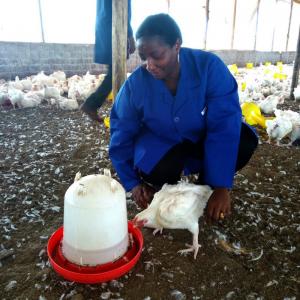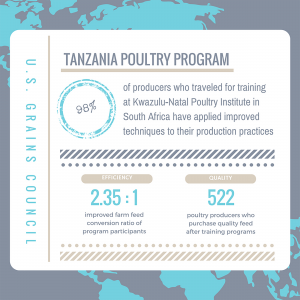U.S. Grains Council (USGC) programming helped one poultry producer in Tanzania shift her burgeoning poultry business into a full-blown brand of frozen chicken.
Elizabeth Mwakajila started a poultry farm with her husband in 2012 in Arusha, Tanzania, with 500 layer chickens. In 2014, she switched to broilers and started contract farming with a local integrated company, producing 6,000 layers per month. It was not until 2016, however, when her marketing plan kicked into high gear.
In September 2016, the Council sponsored Mwakajila’s training at the Kwazulu-Natal Poultry Institute (KZNPI) outside of Durban, South Africa. Upon returning from training at KZNPI and with the guidance and support of the Council’s local staff and consultants, she returned to Tanzania to end her contract and undertake marketing her own chicken to local super markets and hotels.
“The U.S. Grains Council gave me knowledge, which is the best gift,” Mwakajila said. “They gave me a story which I can continue to share with my fellow producers.”
Since the start of 2017, Mwakajila has increased production from 24,000 broilers per month to 40,000 broilers per month. She sells her frozen chicken under her own brand of Tanzanite Chicken to a dozen supermarkets, hotels and restaurants around Arusha, taking orders on average of 1,000 chickens per week.
The Council’s program in Tanzania is funded through the U.S. Department of Agriculture’s Food for Progress (FFP) program, designed to promote the development and professionalization of the country’s commercial poultry and feed sectors. Since the program’s start in early 2014, the Council has trained more than 1,000 Tanzanian poultry producers in farm management practices through local training seminars and training programs like Mwakajila’s at KZNPI.
Upon returning to Tanzania from KZNPI training programs, 98 percent of participants have applied improved techniques to their production practices. In addition, as the combined result of the whole USGC program, 522 poultry producers now purchase only quality feed for their operations, decreasing the average feed conversion ratio of program participants from 2.7 to 2.35:1.
These positive results demonstrate how training seminars, like that in which Mwakajila participated, help expand the local poultry industry. A growing industry in turn generates increased consumption of both poultry and the coarse grains needed to feed them.
More on the progress of the program in Tanzania is available here.


